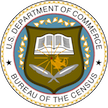 A new report from the U.S. Census Bureau offers data on both same-sex and opposite-sex married couples and unmarried couples. The data is broken down by race.
A new report from the U.S. Census Bureau offers data on both same-sex and opposite-sex married couples and unmarried couples. The data is broken down by race.
In 2016, there were nearly 57 million married opposite-sex couples in the United States. Only 7 percent were Black and 1.7 were of two or more races.
There were 11.3 million unmarried opposite-sec couples living together in the same household in 2016. Of these, 11.3 percent were Black and 2.9 percent were two or more races.
The research identified 435,862 same-sex male couples living in the same households in 2016. Blacks made up 5.5 percent of male same-sex couples. Male same-sex couple of two or more races made up 3.1 percent of all male same-sex couples.
In 2016, there were 451,594 same-sex women couples living in the same household. Of these 9.8 percent were Black and 3.2 percent were of two or more races.
For male same-sex couples who were married, 4.6 percent had two Black partners and 15.8 percent were interracial. For women same-sex married couples, 7.8 percent had two Black spouses and 11.8 percent were interracial.
What has this got to do with higher education? Earlier studies have shown that children from married-couple families are more likely to complete college than children who come from single-parent households. (See earlier JBHE post.) Married-couple families have higher incomes and this is undoubtedly a significant factor in the difference in educational attainment. Also two-parent families may be more likely to have a spouse present in the household to help with homework, read to young children, and participate in school and other learning activities.












